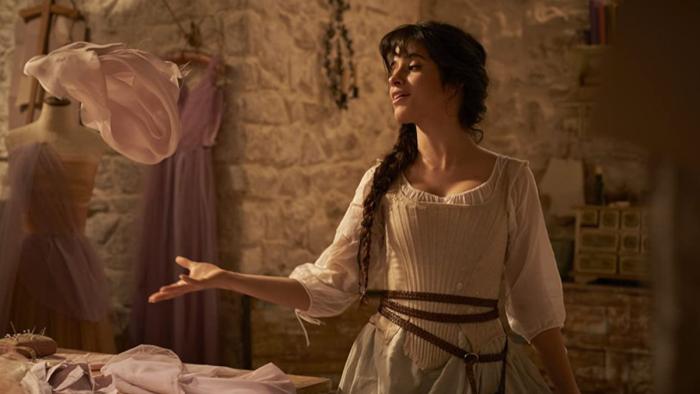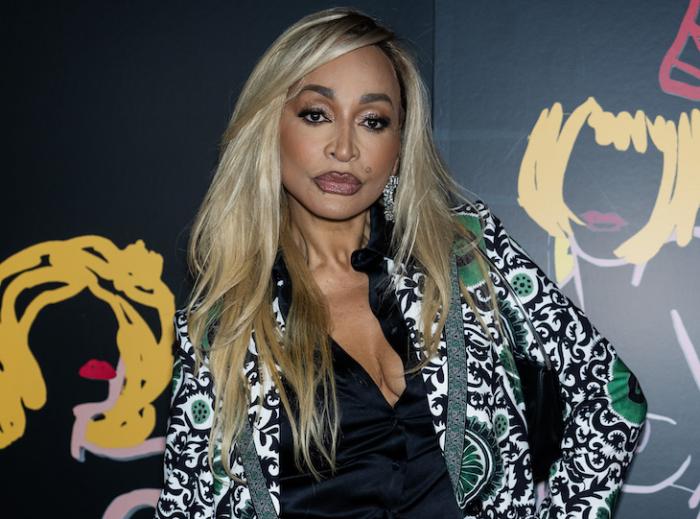

Review: This Ain’t Your Grandma’s ‘Cinderella,’ or an Especially Good ‘Cinderella,’ Really
By Kayleigh Donaldson | Film | September 2, 2021 |
By Kayleigh Donaldson | Film | September 2, 2021 |

Once upon a time, there was a fabulous girlboss named Cinderella (played by popstar Camila Cabello) who lived in a kingdom ruled by conformity. Her semi-evil stepmother (Idina Menzel) has told her to crush her entrepreneurial dreams in favor of marrying a nice man with money. Meanwhile, the handsome prince Robert (Nicholas Galitzine) has been told to find a suitable queen, but he wants to marry for love. Add a fairy godparent with some sass, a few mouse footmen, and a whole lot of familiar songs, and you get a new twist on the fairytale. Apparently.
Fairytale reinventions have been a constant staple of film since its earliest days. Such are the delights of public domain stories. Disney may have a cultural stranglehold on these stories in Hollywood’s eye, but not legally, so anyone can get in on the fun. Enter Sony’s Cinderella, a jukebox musical that seeks to offer a sparkly and modern take on the tale with some ‘feminist’ leanings.
Written and directed by Kay Cannon of Blockers and Pitch Perfect fame, this is clearly an attempt to be the kind of progressive fairytale that Disney is typically accused of not being. We’ve all seen the Buzzfeed listicles smarmily pointing out how Belle totes had Stockholm Syndrome and how Ariel shouldn’t have given up her voice for a man. It’s pop culture feminism 101, the stuff that’s mind-opening as a teenager and can offer a fun gateway to deeper critical thought. It’s far less appealing an idea to build a 110-minute movie around (yes, this film is nearly two hours long, and it is too much.)
The big modernizing change here is to make Ella a dressmaker with dreams of opening up her own small business in a town where the mere idea of women having jobs seems beyond the pale. It is at least given more plot space than the inventor Belle stuff in the Beauty and the Beast remake, although it is similarly surface-level stuff. You see, Ella doesn’t want to go to the ball to meet a prince or to find a night of solace away from her tough life. She wants those networking opportunities, baby. She needs that cold hard cash to get her work off the ground, some strong investments to ensure good capital. As a result, the entire tension of the story has been sapped. We don’t care if she and the Prince even like one another because she’s girlbossing it up, but even those vaguely progressive notions are weakened by constant winks and nods in the script. Yes, we get it, Disney’s Cinderella didn’t have a five-year career plan. Your Ella is so much smarter and a better role model for young girls. Well done, I suppose.
It’s almost startling how contemptuous Cinderella feels towards fairytales as a whole. It doesn’t seem to understand why we return to these stories time and time again, even if certain elements are archaic or questionable in today’s terms. They’re fables that use the fantastical to explore the familiar. The Cinderella tale has endured for centuries because there’s still power in the idea of finding your inner strength amid the darkness. There’s a moment of self-awareness in this film where one character tells Ella, who is constantly riffing on the film’s more speculative moments, that she should let the magic happen and not ruin it with reason. Would that the rest of the movie learn that lesson rather than try to hang a hat on every moment of sincerity or wonder.
Musically speaking, this film is also sort of baffling. The numbers are, by and large, thuddingly obvious choices to the point where you wonder if David Ayer put together the soundtrack after Suicide Squad. When the Prince laments his inability to marry for love, he sings Queen’s ‘Somebody to Love.’ The stepmother instructs her daughters on marrying for money with… can you guess… yes, Madonna’s ‘Material Girl.’ Other moments are baffling, such as the introduction to the town’s conformity and staid nature via Janet Jackson’s ‘Rhythm Nation.’ I’m not sure the filmmakers actually know what that song is about. Spoiler: It’s not about everyone being the same. Cannon is also not the right director for a musical, with most numbers shot as though she’s determined to sap the vibrancy out of each moment. That ‘Material Girl’ scene is just Idina Menzel and two other actresses shuffling around a field.
The movie is intended to be a star vehicle for Cabello, who is clearly talented, but not in the way the film needs. She’s fine for the most part, but her pop voice is not designed for the kind of musical-theatre theatrics the role calls for. Weirdly, one wonders if she would have been better suited for the film had it not been a musical, but at least she’s trying. About 70% of the cast are phoning it in, including Menzel, who’s saddled with a stepmother character who isn’t fun, evil, or interesting in the sympathetic moments. Billy Porter gets to look amazing as the “fabulous” godmother, but is given little to do beyond offer buzzwords and sass. It’s a real waste of two impeccable talents who can do this kind of stuff in their sleep. Minnie Driver and Pierce Brosnan fare much better as the royal couple, whose dynamic of waning love and the smothering restrictions of tradition hints at a much more subversive story.
And since I know you’re wondering: James Corden’s not in it that much. He doesn’t do any hip-thrusting either, mercifully.
I struggle to think of who this movie is for. It doesn’t offer its star much do to. It’s a serious dilution of the kind of raunch and subversions in which Cannon thrives. The cover songs are pretty meh. The jokes mostly don’t land. The production design is nice, but it’s been done better in other Cinderella stories, most recently Disney’s own live-action remake. That’s the major problem here: it’s all been done before. This is filmmaking by committee, or rather, filmmaking by the algorithm. With the film making its debut on Amazon, it feels like content created explicitly to appeal to as many demographics as possible, but really, it’s not for anyone. The original fairytales can certainly use a refresh or two, but this Cinderella seems desperate to be anything other than a fairytale. Is it so wrong to want a little magic?
Cinderella premieres on Amazon Prime on September 3.
← 'Clueless' Has the Most Accurate Teen Seduction Scene Ever | 'The Wheel of Time' Trailer: The Wheel Weaves as the Wheel Wills on November 19 →
More Like This
David Dastmalchian's 'Late Night with the Devil' Takes the Late-Night Wars into Horror
Review: 'Damsel' Needs Saving from the Soulless Netflix Formula
In 'The Animal Kingdom,' Humans Turn Into What They Truly Are: Animals
'Quiet on Set' Tracks Dan Schneider's Unsettling Two-Decade Reign Over Nickelodeon
'Girls5Eva' Season 3 Is the B3st Y3t

Another Day, Another 'Real Housewives' DUI
'The Office' Reboot Adds 'Nathan For You' Co-Creator
The Experiment With Diversity Is Over in Late Night TV, Suggests Dulcé Sloan
Jordan Klepper Got A "Glimmer Of Hope" From A Trump Supporter
Leave Josh Peck Alone, Says Drake Bell in the Wake of 'Quiet on the Set' Revelations
Sophie Turner Has ‘Reactivated’ Her Divorce From Joe Jonas
More Like This
David Dastmalchian's 'Late Night with the Devil' Takes the Late-Night Wars into Horror
Review: 'Damsel' Needs Saving from the Soulless Netflix Formula
In 'The Animal Kingdom,' Humans Turn Into What They Truly Are: Animals
'Quiet on Set' Tracks Dan Schneider's Unsettling Two-Decade Reign Over Nickelodeon
'Girls5Eva' Season 3 Is the B3st Y3t
Reviews